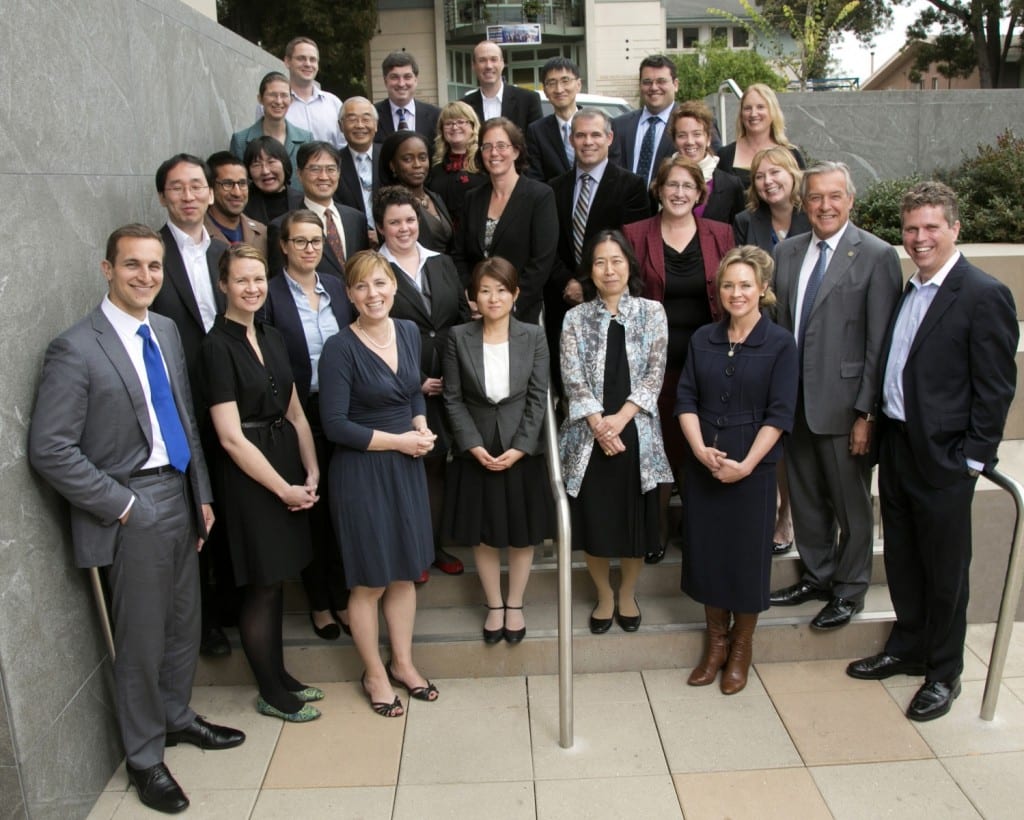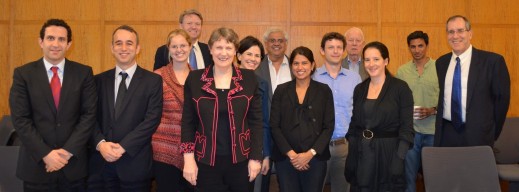.jpg)
August 27, 2012 (Monday)
Welcoming Reception for Incoming International Law Students
Rooftop Terrace, Boalt Hall, 5:00-7:00 pm
The Miller Institute is hosting a reception to welcome incoming law students interested in international law. Student will have the opportunity to meet members of the international law faculty, the International Law Society, and the Berkeley Journal for International Law.
September 7, 2012 (Friday)
.jpg) Northern California International Law Scholars Meeting
Northern California International Law Scholars Meeting
Warren Room (295 Law Building), 9:00 am-5:00 pm
A network of international law scholars will meet to discuss their current research. Topics include: Constitutions and Human Rights Treaty Commitments (9:05-10:05 am); Private Equity Investments in Indian Firms (10:15-11:15 am); War Crimes Through the Pink Glasses of National Identity (11:30 am-12:30 pm); Human Rights Backsliding (1:30-2:30 pm); Moral Damages in Investor-State Arbitration (2:45-3:45 pm); and Global Human Rights Entrepreneurs (4:00-5:00 pm).
A limited number of seats will be available to students for each session. Students who wish to attend should email Leslie Stone (lstone@law.berkeley.edu) no later than Wednesday, September 5; please include the name of the session(s) you wish you attend in the email.
 September 7-8, 2012 (Friday-Saturday)
September 7-8, 2012 (Friday-Saturday)
Conference on “The South China Sea and Re-Assessing Regional Order in Asia”
Institute of East Asian Studies, 2223 Fulton Street, 6th Floor, 9:00am-6:00pm
Sponsored by the Institute of East Asian Studies and the Center for Chinese Studies
The South China Sea has recently been a flashpoint in relations between an increasingly powerful China and nations that ring the sea. Resources, strategic interests, security concerns, and legal aspects of the conflict are the subject of this conference.
All sessions are free and open to the public. For more information, see the conference website.
September 13-14, 2012 (Thursday-Friday)
.jpg) Conference on “Democracy Rising? Global Prospects, Perils, and Policy Challenges”
Conference on “Democracy Rising? Global Prospects, Perils, and Policy Challenges”
Heyns Room, Faculty Club
Co-sponsored with the Institute of Governmental Studies, the Institute of International Studies, the Center for Middle Eastern Studies, the Institute of Slavic, East European, and Eurasian Studies, and the Religion, Politics, and Globalization Program, UC Berkeley
This two-day conference will address the challenges of democracy transition and development for countries emerging from authoritarian regimes. Topics will include: Global Trends in Democratic Transitions; Democracy Engagement and Civic Participation; Managing Pluralism Within the Rule of Law; The “Arab Spring”; Russia in Transition; and Policy Lessons for Democracies.
A limited number of seats are available for each session. For more information or to make a reservation, visit the conference website or contact Alan Unger (afunger@berkeley.edu).
September 20, 2012 (Thursday)
.JPG) Brown Bag Lunch Talk – Careers in International Law
Brown Bag Lunch Talk – Careers in International Law
Anne Quintin
Public Affairs Officer, International Committee of the Red Cross
141 Law Building, 12:45-1:45 pm
Anne Quintin, Public Affairs Officer with the International Committee of the Red Cross (ICRC), will be meeting with students to discuss careers in international law. Ms. Quintin will also be addressing Prof. Kate Jastram’s International Humanitarian Law class in the afternoon.
Ms. Quintin recently joined the ICRC delegation in Washington, DC to liaise with academia in North America on International Humanitarian Law. Between 2008 and 2011, she worked at the ICRC Headquarters in Geneva as Head of Project in the Civil Society Relations Unit, and co-edited the 3rd Edition of How Does Law Protect in War alongside Marco Sassoli and Antoine Bouvier. Prior to joining the ICRC, she worked for the International Institute of Humanitarian Law in Sanremo and in Geneva.
Ms. Quintin graduated in Politics, Philosophy and Economics from the University of Kent (England). She holds a master’s degree from the Institut d’Etudes Politiques de Lille (France) and an LL.M in International Humanitarian Law from the Geneva Academy of International Humanitarian Law and Human Rights.
September 28-29, 2012 (Friday-Saturday)
Four Societies Conference on “Disasters and International Law”
Warren Room (295 Law Building), 9:00 am-6:00 pm
Co-sponsored with the American Society of International Law
[PROGRAM] [ROSTER OF PARTICIPANTS]
This conference will feature papers on the theme of disasters and international law presented by members of the international law societies of Australia and New Zealand, Canada, Japan, and the United States (the “Four Societies”).
A limited number of seats will be available to students. If you are interested in attending or need more information, contact the Miller Institute (mgcl@law.berkeley.edu).

October 8, 2012 (Monday)
 “Demystifying Personal Jurisdiction”
“Demystifying Personal Jurisdiction”
Simona Grossi
Associate Professor of Law, Loyola Law School Los Angeles
132 South Addition, 12:45-2:00 pm
[BIOGRAPHY] [PAPER ON SUPREME COURT’S PERSONAL JURISDICTION CASES]
Professor Simona Grossi (Berkeley Law, LLM ’09, JSD ’11) argues that “the plethora of doctrines surrounding the law of personal jurisdiction has added more confusion to the law than they have coherence. Among other things, they confuse the sufficient with the necessary and they elevate the technicalities of doctrine over the fundamental principles at stake. As a consequence, I advocate a return to those principles traceable to International Shoe and Pennoyer and I suggest that these principles be codified in a ‘due-process-style’ rule premised on connecting factors and expectations.”
Professor Grossi joined Loyola Law School LA in 2010. Her scholarship focuses on civil procedure, transnational litigation and harmonization of procedural law.
October 23, 2012 (Tuesday)
Brown Bag Lunch Talk – Careers in International Humanitarian Law
Col. Richard B. “Dick” Jackson (RET)
Special Assistant to the US Army Judge Advocate General for Law of War Matters
244 Law Building, 12:45-2:00 pm
.jpg) Dick Jackson has served as the Special Assistant to the U.S. Army Judge Advocate General for Law of War Matters since 2005, when he retired from the U.S. Army after over 30 years in uniform.
Dick Jackson has served as the Special Assistant to the U.S. Army Judge Advocate General for Law of War Matters since 2005, when he retired from the U.S. Army after over 30 years in uniform.
He has extensive experience in the law of war and international and operational law, in general. He served in Infantry, Special Forces, Joint and Coalition commands during his military career, spending most of the last ten years as the principal legal advisor at a U.S. Army Division, Multinational Division North in Bosnia, the Army Special Operations Command, U.S. Army Pacific, and Joint Forces Command – Naples, a NATO Headquarters. He served in military operations in Panama, Haiti, Bosnia, Kosovo, and Iraq.
He was also the Chair of the International and Operational Law Department of the Army Judge Advocate General’s School, in Charlottesville, Virginia, and has written extensively in professional publications and lectured around the world on law of war matters, including “Interrogation and Treatment of Detainees in the Global War on Terror,” in The War on Terror and the Laws of War: A Military Perspective (2009). In 2010 he was elected to be the Chair of the Lieber Society Interest Group of the American Society of International Law.
October 25, 2012 (Thurday)
 “Human Rights Challenges for the Next President” Scott Busby (’90) Senior Advisor, Bureau of Democracy, Human Rights and Labor, US Department of State
“Human Rights Challenges for the Next President” Scott Busby (’90) Senior Advisor, Bureau of Democracy, Human Rights and Labor, US Department of State
Warren Room (295 Law Building), 12:45-2:00 pm
This event has been postponed.
October 29, 2012 (Monday)
International Law Professor Panel
12 Law Building, 12:45-1:45pm
This event has been cancelled.
November 7, 2012 (Wednesday)
Discussion on the United Nations Development Programme (UNDP)
Helen Clark
UNDP Administrator
Boalt Hall
Helen Clark will come to Boalt Hall to discuss the work of the United Nations Development Programme (UNDP) with members of the Berkeley Law and campus faculty. Topics of discussion will include: the relationship between UNDP and civil society, especially in countries with repressive regimes and in post-conflict societies; how to persuade donor countries to invest not only in short-term relief operations, but also in long term capacity-building, so that states become resilient and capable of addressing future disasters; and how small projects that worked could be scaled up, and innovations from developing countries might also become useful templates for in richer states.

November 14, 2012 (Wednesday)
.jpg) Presentation and Panel on “The Beginning and End of Borders”
Presentation and Panel on “The Beginning and End of Borders”
132 South Addition, 4:00-5:30 pm
Presentation by
Alan Bersin
Assistant Secretary for International Affairs and Chief Diplomatic Officer
U.S. Department of Homeland Security
Followed by a panel discussion with Kate Jastram and Maria Echaveste
[BERSIN PAPER] [BERSIN BIOGRAPHY]
Alan Bersin will be presenting his work on “Lines and Borders: The Beginning and End of Borders,” which traces the post-9/11 shift in viewing borders not only as lines but as movements – flows of people and goods on a global scale both legally and illegally – and explores the domestic, international, and intermestic effects of security and economic developments over the next decades. Mr. Bersin oversees the Department of Homeland Security’s international engagement and serves as the principal advisor to Secretary Janet Napolitano on all international affairs. Previously, he served as Commissioner of U.S. Customs and Border Protection.
November 20, 2012 (Tuesday)
 “Elections, Democracy Building and Civil Society in a Peri-Conflict Region: The 2012 Presidential Election in Nagorno Karabakh Republic”
“Elections, Democracy Building and Civil Society in a Peri-Conflict Region: The 2012 Presidential Election in Nagorno Karabakh Republic”
132 South Addition, 4:00-6:00 pm
Co-sponsored with Berkeley Law’s Election Administration Research Center; the Armenian Studies Program, the Institute of Slavic, East European, and Eurasian Studies, UC Berkeley; and the Human Rights Initiative, UC Davis
On July 19, 2012, the Republic of Nagorno Karabakh held its fifth presidential election since declaring independence in 1991. Two candidates, Vitaly Balasanyan and Arkady Soghomonyan, challenged the incumbent President Bako Sahakyan. President Sahakyan won re-election. A team of Elections and Human Rights experts from UC Berkeley and UC Davis were part of a California group that travelled to Nagorno Karabakh to observe the election. Please join us for the election observer’s reports, followed by a panel discussion of the salient issues in elections and governance of Nagorno Karabakh. This event is free and open to the public.
For more information, contact Bonnie Glaser (510-642-8506 or bg@earc.berkeley.edu)
.jpg)